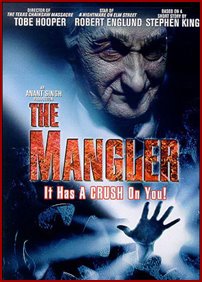
"And did the Countenance Divine Shine forth upon our clouded hills? And was Jerusalem builded here Among these dark Satanic mills? "
William Blake, "Jerusalem."
"We all have to make sacrifices!" --from the Mangler-screenplay, 1995
Coming from Stephen King's 1978 collection-of-shorts, "Night Shift", Tobe Hooper brings us his very different-take: a parable of 19th Century, proprietary capitalism and the nightmare of the American workplace. This film is what labor conditions were 100-years-ago, and what they could easily become again if we aren't too careful. Since the discovery of a slave sweatshop in El Monte, California a few-years after the release of this film, the story's settings aren't so fantastical.
Maybe some of us were too-comfortable to "get" this film in the Clinton era. Most people don't get this film at all, even just watching it on its surface levels. It's a real hoot! Yep, you can watch it with a beer, and you can watch it with an open-mind thinking about its deeper-meanings, or you can do both. And--shocker!--ALL of them are FUN.
Tobe Hooper has said for decades he wanted to do comedy, and he comes close here, which helps this film from being too-oppressive. I think he understood the story better than Stephen King--it seems King worked in a clothes-pressing plant like this one in the 1960s, which gave-rise to it, but Hooper has always struck me as politically-radical in his approach-to-horror. And radical this story is, and bizarre.
Sometimes I think Tobe Hooper had the idea that this film would be much-bigger, but he still achieves something lasting here. Not only is Mangler a parable of modern capitalism, it is a story of a disease that eats a person's humanity until it's gone, and it is multi-generational. The best horror usually has a real subversive-edge, and this is what makes this a good one. Sure, Mangler can be hokey, but it has its tongue firmly planted in-cheek, and it is a jokey movie. It also has some sub-themes in the lines, "There's a piece of me in that machine--and a piece of it in me." It speaks well of how people are spiritually contaminated by our system. The disease is greed.
If it wasn't for Ted Levine ("Buffalo Bill" in Silence of the Lambs) as the bedraggled town cop John Hunton, Robert Englund would literally steal the show here. Tobe uses some great low-shots and wide-angle lens compositions (ala "Citizen Kane"and Fritz Lang) that lend the film a great comic book look, and make Englund shine as a despicable villain. The irony is, mill owner Bill Gartley is also a victim of the machine, which robs him of the ability to walk, probably the most subversive element of the story.
The proprietor Gartley is hobbled and half-blind, which makes sense for a symbol of a tyrannical employer who is being eaten alive by his role. The characters are pretty well-drawn, and we learn that Detective Hunton has some baggage left-behind from the death of his wife in a car-accident, years earlier. He just doesn't care about being a cop anymore.
The town is run like a virtual-dictatorship by Gartley, who basically represents the "robber barons" of the 19th century (as well as today), completely uncaring about the safety and welfare of his employees. He's a man who has lost his humanity. Sound familiar? Eventually, an accident occurs where the niece of Englund's character spills her own blood on the "Mangler", a clothes-press that must be at least 100-years-old.
Another shop employee spills her belladonna-laced antacids into the guts of the machine, and it begins taking-victims...and parts. Oddly, all the people Bill Gartley "owns" (the Mayor, the Police Chief, Doctors, etc.) have missing-fingers. Of course, the premise of a demonically possessed machine is fantasy, which is what makes the story a parable, but it's fun.
In time, Detective Hunton finds that the Gartley dynasty has been sacrificing their own young to the infernal machine for a century, and now they're "spreading the love". Don't all employers? Some require the blood of a virgin! So, people have been wrong about this one. It's a minor classic of a bad decade for horror. The genre has its fallow periods where interest isn't as high, and 1995 wasn't exactly a banner year for horror buffs.
And quit comparing every film a director does to their most well-known ones, it's emotionally retarded. You know who you are. This is a solid horror-film, and if it had been presented in the proper context, it would have been better appreciated. The short story is good, but this is better, and Stephen King sure isn't Edgar Allan Poe or Lovecraft ferchrissakes.
The New Line DVD is great, it has a perfect widescreen transfer, and even includes the gore that was cut with split-screen comparisons to the theatrical-version. It's a great horror film, and a respectable one for Tobe Hooper. Now you can all go and rewatch the original "Texas Chainsaw Massacre"--just don't touch-yourself so much this time. We all have to make sacrifices, after all.
No comments:
Post a Comment